Continued from page 1....
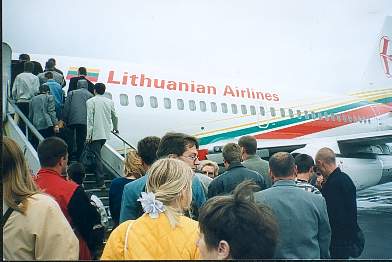 Click on Photo for the Lithuanian flag!
Click on Photo for the Lithuanian flag!The Lada is also rapidly disappearing as the market is flooded with cheap German imports, which incidentally, don't handle the poorer roads of Lithuania in the same way as the sturdy Lada or Volga. In Vilnius the conservative mayor, Rolandas Paksas, recently the surprise victor in the Presidential run-off against incumbent Valdas Adamkas, undertook an extensive renovation of Vilnius Old Town which changed it from a quaintly run down example of Soviet stagnation to a bustling, clean, cosmopolitan tourist must. In Linkuva, much remains the same, although with some visible signs of a growing affluence for some. Nevertheless, much of this is superficial; the local cheese factory, probably the main employer in the village, closed down a couple of years ago, and unemployment is high. Whilst Vilnius has blossomed, becoming one of the most expensive cities in the world for business real-estate, out in the provinces, things aren't moving so quick. Nevertheless, it is the same now as it was in 1994: the people of Linkuva are the friendliest I have met. It is typical of attitudes throughout the world; it is often those who have least that are most likely to share. This attitude is one that I think I learned most from my time in Lithuania. I remember coming home to Britain from Linkuva. It was Christmas time, and contrary to the hectic hard sell of Christmas in the West, which starts in October, there was no real feeling of Christmas until Christmas Week. Christmas meant holidays and family and friendship, not rampant consumerism. It was a pleasant experience. When I arrived back in London and we drove through the city, everywhere was corporate demands for you to part with cash in the interests of Christmas. It made me sick. I'm not stupid and I know that this frenzy is an economic necessity in our country, but the Lithuanian Christmas experience was refreshing and in a way almost Dickensian. The true spirit of Christmas!
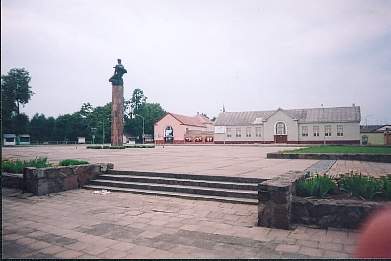
The Main Square in Birzai looking towards the Market and Bus Station
THE LINKUVA STRANGLER
An interesting incident during my stay in Linkuva, made me quite afraid for a time. One morning I went into school and the Staff Room was abuzz. I struggled to understand what sensational happening had occurred, but assumed it was only something run off the mill. Perhaps our wages had been delayed, or we were being asked to work extra hours. Then Antanas the Deputy Headmaster came over to me with a twinkle in his eye. He said a word I did not understand but as I always carried my pocket dictionary with me, I had soon looked it up. The word was KILLER. As it turned out, two down-and-outs had been killed by someone in the village, Linkuva having approximately 2000 people. I was horrified! I had come to live in a land of serial killers and my life was in danger! My mood was not helped when at the next break, Antanas continued to rib me. Take care to lock your door tonight, he said with the same twinkle as before. Perhaps he will come for YOU! The teachers all laughed. I didn't sleep much that night. Next day it turned out that the mystery had been resolved and a mentally disturbed man had been arrested for killing the tramps and was sent to a Mental Institution. At least that's what I was told. To this day, I still not sure if there had ever even been a killer, or if I had just been the victim of a practical joke!
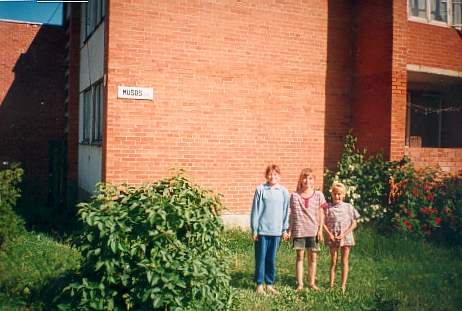
Some kids from My Street, Musos Gatve, or the Street of the River Musa
THE FIRST DAY OF WINTER
I had heard about Eastern European winters, Siberia and the frozen wastes, but had never really experienced true cold. Scotland is a lot colder than England, but the tempretaure is never really that cold where I come from. I wasn't prepared for the Lithuanian winter, therefore, which was, as we say in Scotland, Baltic! During October, I had frozen in my flat. The heating did not come on until mid-October, the central heating being not controlled centrally in the house, but centrally by the town council-they controlled when the heating came on and at what temperature. Even once the heating came on, I still felt colder than I had ever felt before. One morning I awoke and looked out to see a stormy morning. It was raining and I was struck by the fact that the ground seemed incredibly shiny. I got ready and went out for my walk to school. I quickly realised to my horror that the reason the ground was shiny was because the rain was freezing the second it hit the ground. I had never seen this happen before. The pavement was a sheet of the smoothest ice I had ever walked on. Worse still, I lived at the bottom of a hill! I edged my way centimetre by centimetre until I reached almost the brow of the hill. My last step I took too quickly in a bid to reach the summit. I lost my balance and slid all the way, the 50 metres back to the bottom! My second attempt, I ensured that I held onto the fence at the side of the road and slowly negotiated my way to school.
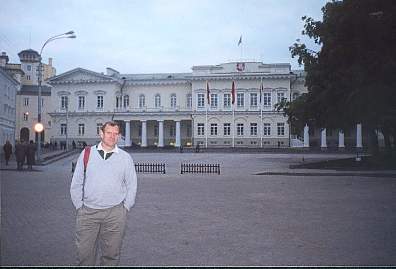
My Dad Outside The Presidents Palace in Vilnius 1999
This was one of only two occassions I remember falling in the ice in two years, the second time being when I wore ungripped shoes to nip out to the shops in Pasvalys. I saw someone I knew and waved, but this temporary lapse in concentration caused me to slip heavily landing clean on my backside with a thud that rattled my teeth to their very roots. Needless to say the person I had waved at laughed themselves silly! During my second winter, the temperature dipped to minus 28 degrees centigrade which used to cause us the most bitter arguments in Panevezys. Three of us, Ewen, my then girlfriend and I spent the New Year Holiday in an empty flat she had just moved into. There was little to do and it was -25C. We spent hours playing cards just in order to decide who went to the off-license 300yards away to buy beer. I took 20 minutes to clothe-up for the trip and not one of us wanted to do it, the cold outside was so bitter. Once, Ewen and I bought a bottle of beer on our way back to the flat. By the time we walked the 10 minutes to the flat, the beer had frozen solid. I left it on the windowsill above the heater, but next morning, it was still frozen! That's how cold it was IN my flat. I slept fully clothed all winter!
THE POST OFFICE
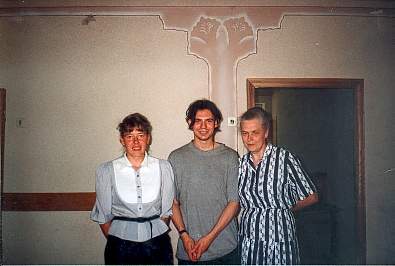
The Post Office Women and me on they day they passed their exams.
The Post Office Women of Linkuva were very friendly and much help to me. One odd experience though was when I went in to try to phone my mother in Scotland. I didn't have a phone in my flat and so relied on other people's or on the Post Office's. In order to make a phone call from the Post Office, you went in and the woman behind the counter placed a call with the operator. After the call ended you had to wait until the operator called back and told the Post Office how much you owed for the call. I asked if it was possible to call Scotland. No was the answer. I asked if she was sure and she nodded her head. Disappointed and confused I turned to leave, but was ordered to wait. Within 5 minutes, I was talking with my mother! This is something I could never understand and put it down to Soviet attitudes. You ask if something is possible but are told that it isn't. Then miraculously, the thing is done with such ease that you suspect a miracle has just occurred! I recently read a book about Americans cycling from Vladivostock to St Petersburg in 1989. In Krasnoyarsk in Siberia, they tried to place a call to America. A Russian woman helped them. She called the operator in Krasnoyarsk to ask if they could place a call. She said that they had to place an order with the international operator. This meant calling Moscow. The operator in Moscow said they had to place an order with the International Operator. They said they were speaking to the International Operator and the operator said yes, but the International Operator in Moscow. They needed to ask the International Operator in Krasnoyarsk. They said the operator in Krasnoyarsk had said that they had to call Moscow. Moscow said that this was because Krasnoyarsk was a Closed City and so no international calls could be made from there. They gave up hope, but an hour later the phone rang and they were connected to America. This byzantine buearocracy with its surreal attitudes is stereotypical of the ex-Soviet Union, it seems!
In the summer shortly before I left Linkuva, I went into the Post Office to send a letter. The two Post Women grabbed me and took me into the back office. They explained that they had sat their annual Public Servant's Exams that morning and had passed, meaning at least another year of employment. They were celebrating and invited me to be their guest and we gorged on champagne, brandy and snacks. We all left at closing time quite merry!

The Post Office Women of Linkuva 1995
Similarly, when I took my Dad to Linkuva in 1999 to show him where I had lived and worked, we went to the Post Office to send postcards home. We were again taken into the back room and drank bottles of champagne. I think this impressed my father immensely.
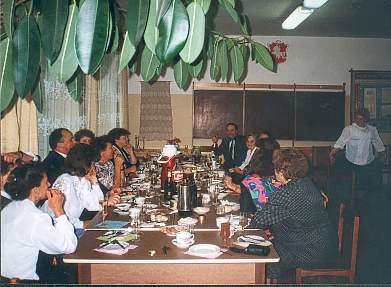
The Party after the English Exam, Linkuva 1995
JAMES BOND, GEOGRAPHY TEACHER
The Geography Teacher in Linkuva had spent 10 years adapting his classroom into a gadget-enhanced teaching experience. He controlled all this from a Control Panel at his desk. He pressed a button and the curtains closed. Another caused his desk to open and a TV ro raise itself from inside. Similarly, a door opened at the back of the classroom and a projector appeared, the screen unfurled from above the blackboard, and a film-strip began. A variety of other gadgets worked making the Geography room all the pupils' favourite.
SCHOOL LUNCHES
Every day I had school lunches. For 1 Litas, equivelant of about 15 pence, or 25 euro cents you could have a bun, a plate of soup, a main course and as many jars of sugary tea as you wanted. Most days I had the company of Mindaugas of class 7b and his friends who always made a point of sitting with me. They were always interested in the foreigner and every day I was faced with a barrage of questions about Scotland, about my life in Linkuva, about anything their curious minds were dominated with that day. They didn't call me Malcolm, but Scotsman (Shkotai), or after Lithuanian TV started showing the serial Highlander starring Adrian Paul, a spin-off of the famous film starring Sean Connery and Christophe Lambert, HIGHLANDER. In Pasvalys I was universally known as Highlander! I remember a touching moment before I left Lithuania in 1996.
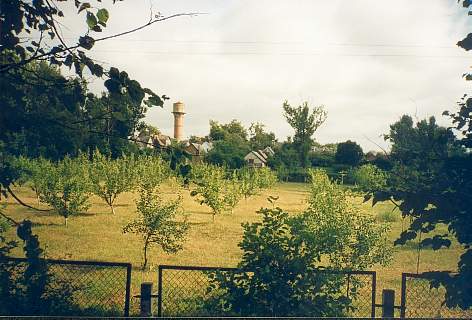
A Typical view of an orchard in the centre of Linkuva from Rudens Street
I had returned from Pasvalys to say my final farewells to my friends in Linkuva before returning to Scotland, not knowing when or if I would return. As I walked the final trip to the Bus Stop that would take me home, I passed the Town's Main Square. Three men, clearly the worse for drink started shouting at me. I assumed they were beggars and would ask me for money to buy more beer. They shouted SCOTSMAN, SCOTSMAN and staggered over to me. I was preparing my refusal to give them money when the oldest said: Scotsman, we knew you wouldn't forget us! Then all three shook my hand and wished me a safe journey. I left Linkuva with a sense of enormous pleasure at this little incident and a little ashamed at my aerroneous assumptions about them!
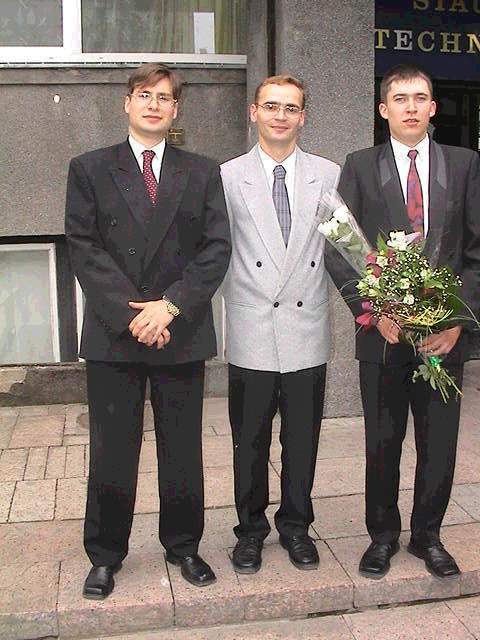
Dainius Balbonas' Graduation from Siauliai Technical University 2002. Dainius is in the centre.
Back to the food, it generally was quite poor quality but it's cheapness was wonderful. The best days were when you got beetroot soup and a beesteak, or pancakes. However, I tended to go hungry on the days you got milk soup and cepelinai! Cepelinai is the national dish of Lithuania. It is named for Zeppelins, which they resemble in shape. To make a Cepelinai, a potato is taken and grated (I hope I have understood the process correctly and am not insulting the national dish!) Half the gratings are placed in a muslin bag and are crushed to remove all the liquid, leaving what is virtually potato flour, an arduous task, but one which now has a machine invented to make it less labour-intensive! The flour and the remainde of the gratings are mixed up with a binding agent and rolled flat. Either meat or curds are placed in the centre and the mixture is re-constituted to look like a potato again. It is then boiled in water and served covered in a sauce made from melted pig fat, with little bits of fat added, called spirguchai and cream. To me it always seemed like such an effort for a scant reward, but Lithuanians love Cepelinai. In fact, Lithuanians have 1001 potato recipes; I have never known a country to use the potato with such adaptibility, things that no sane mind would ever dream of doing to the humble tuber, but the one thing I never saw a Lithuanian do was the simplest thing you can do to a potato: bake it as is in its own skin! Once I did this and was asked what I was doing, with a look that suggested I was insane!
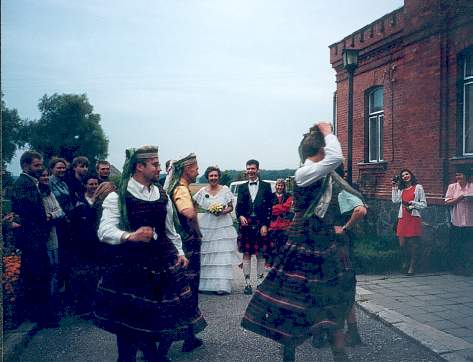
When Ewen and Saule arrived at their wedding reception, these Lithuanian men dressed in traditional Lithuanian female Folk dress and did a dance. They said if the Scotsmen could wear skirts(kilts) so could they!
At home, I was often hungry also. This was entirely my own fault. The School paid me £50 a month. In Scottish Terms, this is less than unemployed people get in basic social security money in 2 weeks, but for Lithuania, it was a fairly good wage, especially as the school paid my rent and bills for me. However, the money was good as long as I stayed in Linkuva. I could live and eat like a king in Linkuva. I wanted, though, to go and see places in Lithuania, and spent many week-ends going all over Lithuania with other Scots. I spent week-ends in Taurage, Siauliai, Vilnius, Pakruojis, Vilkaviskis, Druskininkai, Klaipeda, Ukmerge, Panevezys, Velzys, Birzai, Zarasai and mainly UTENA, as well as spending the odd afternoon in other places like Kaunas, or Sakai, or Joniskis.
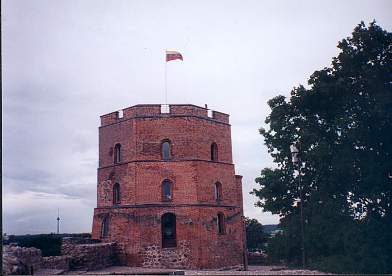
Gedemino Bokstas or Tower, Vilnius
This cost money, so I tended to spend two weeks eating bread and cheese and drinking hot water in order to ensure that I had enough money to spend week-ends away, eating and drinking well. The Scots were very socially-minded and looked after their own. If you were really short, there was always someone who would help you out and you would do the same for them when they were short. It was an excellent experience and I never regretted being poor and hungry in order to enjoy these week-ends!
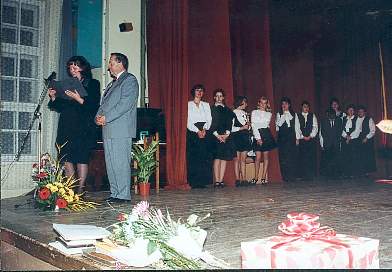
Dicpetris is presented with greetings from the Ministry of Education on the 80th Anniversay of the School
MY TOP TEN LITHUANIAN ALBUMS(Album name first, Band name second
1, Paveikslis, The Best Of Foje
2, Jazz'e Tik Merginos, Biplan
3, Yra Cia, Airija
4, Geruausios Dainos, The Best of Naktinis Personas
5 O Meile! Andrius Mamontovas
6, Telebimbadienis, Tele Bim-Bam
7, Sutaras Traditional Folk Songs, Sutaras
8, Vandenyje, Foje
9, Cia Batai, Various
10, Vilnius, Kaunas, Klaipeda, Foje
Let me know of you agree with these or otherwise!
Click here for Contents Page
Click here for Page 3